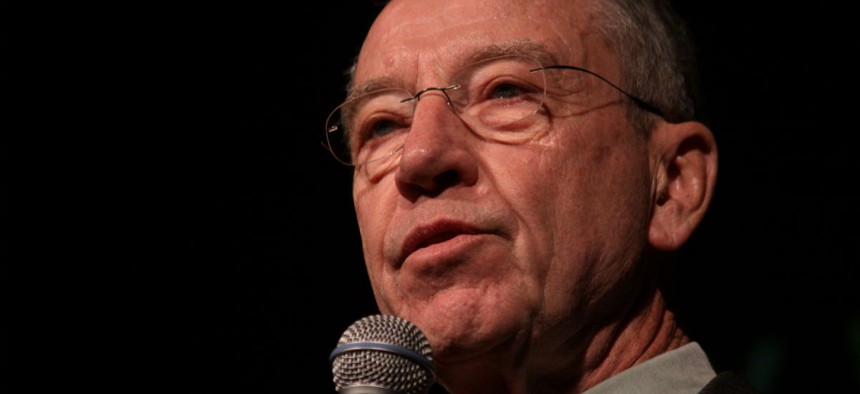
Sen. Charles Grassley, R-Iowa, says he considers White House response to his letter to be progress. Flickr user Gage Skidmore
White House Gives Ground on Agencies’ Selective Responses to Congressional Oversight Queries
Grassley letter to legislative director prompts promise to consider minority party requests.
The White House is no longer rigidly defending a Justice Department opinion that the Trump administration was using to instruct agencies to respond only to majority party committee chairmen when answering oversight questions.
Giving some ground in an area that has been a bone of contention with Democratic lawmakers who feel ignored, White House Legislative Affairs Director Marc Short in a July 20 letter assured Senate Judiciary Committee Chairman Chuck Grassley, R-Iowa, that agencies will broaden their responsiveness.
Past administrations have tended to regard all members of oversight panels, not just those in the majority party, as entitled to receive information and documents from agencies. But Democrats demanding information in such areas as the General Services Administration’s handling of the Trump International Hotel have complained of being ignored and told that agencies are working with committee chairmen only.
Agencies also have workloads to consider and sometimes respond more slowly to requests from individual members of Congress.
“This administration views congressional oversight of the executive branch as an important and necessary means for Congress to evaluate the performance of all executive branch agencies, departments, programs and personnel,” Short wrote in cautious language after a meeting with Grassley. “We agree that the executive branch has greater obligations in responding to requests from a committee, chairman and ranking member, or through a majority of its members, than it does in responding to individual requests from individual members.”
The White House, however, agreed that agencies should “voluntarily release information to individual members where possible, even though individual members cannot by themselves legally compel such release.”
The White House had been relying on a May letter from Justice’s Office of Legal Counsel for its approach, though Short stressed that the OLC’s memorandum was not “a statement of administration policy” but legal advice consistent with the work of the Congressional Research Service.
Grassley, who released the White House letter on Friday, had written the White House on July 7 saying, “Every member of Congress is a constitutional officer, duly elected to represent and cast votes in the interests of their constituents. This applies obviously regardless of whether they are in the majority or the minority at the moment and regardless of whether they are in a leadership position on a particular committee. Thus, all members need accurate information from the executive branch in order to carry out their Constitutional function to make informed decisions on all sorts of legislative issues covering a vast array of complex matters across our massive federal government.”
On Friday, the senator said he considered the White House response to be progress. “I’m glad to see that the administration has decided that timely and responsive answers to congressional oversight inquiries is the best way forward,” he said in a release. “This response shows a commitment to follow through on the promise to drain the swamp by fostering more accountability at these federal agencies. When all 535 members of Congress can effectively conduct oversight and get answers, they can better serve the American people. I’d still like to see the OLC opinion rescinded, but this is a very good start.”
One reason Grassley was able to draw out the White House, according to staff investigative counsel DeLisa Lay, is that he had placed a hold on President Trump’s nominee to head Justice’s Office of Legal Counsel, Steven Engel. Engel, Grassley noted, has now promised to review the OLC opinion that justified the Trump approach of having agencies respond only to committee chairmen.
Lay spoke at a “whistleblower summit” on Capitol Hill sponsored by the nonprofit Government Accountability Project and the Make It Safe Coalition in the run-up to the July 30 National Whistleblower Appreciation Day. “Grassley knows that those in the majority will not always be in the majority,” she said.
“What’s most upsetting” about the Trump requirement that agencies ignore minority member requests, said Liz Hempowicz, policy counsel at the nonprofit Project on Government Oversight, is that the Office of Legal Counsel opinion “treats requests from members of Congress as a lower priority than requests from the public under the Freedom of Information Act.”
If agencies continue to stonewall oversight requests from members of the minority party in Congress, added Tom Devine, legal director of GAP, “that makes the role of whistleblowers all the more crucial.”
NEXT STORY: Play of the Day: Scaramucci's Phone Call







